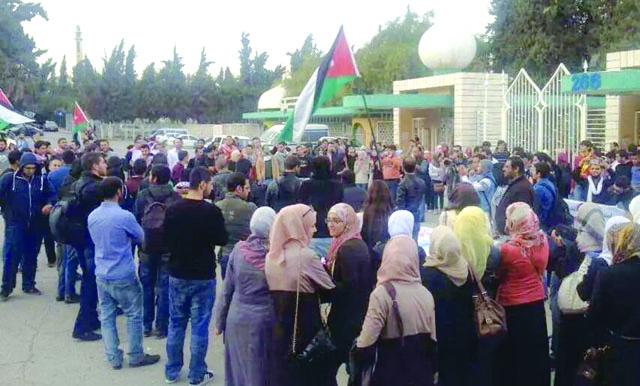You are here
MPs, professional associations oppose UJ tuition hikes
By Dana Al Emam - Jun 18,2014 - Last updated at Jun 18,2014
AMMAN — Members of the Lower House and representatives of professional associations on Wednesday voiced their rejection of the University of Jordan’s (UJ) recent decision to increase tuition fees for postgraduate and parallel programmes.
Deputy Mohammad Qatatsheh (Tafileh, 1st District), who heads the Lower House Education Committee, said such decisions make access to education “exclusive to the elite” and to international students.
At a meeting held by the National Campaign for Defending Students’ Rights (Thabahtoona), Qatatsheh charged that the Kingdom is heading towards “educational tourism”, while Jordanians are facing great difficulties accessing affordable education.
Qatatsheh claimed at the event, held at the Professional Associations Complex, that the government’s annual spending on higher education is only JD52 million of the allocated amount, which reaches JD370 million.
Under a decision taken by the university earlier this month, as of the 2014-15 academic year the price of one credit hour in a UJ MA programme will range between JD150 and JD230, while one PhD hour will cost between JD180 and JD250 depending on the specialty,
The UJ administration has said that the hike is the “last resort to save the university” which is suffering from a 27 per cent deficit in its JD140- million budget.
Professional Associations Council President Mahmoud Abu Ghanimeh described UJ’s decision as a “shocking and unprecedented disregard for public opinion”, adding that it negatively affects a large number of Jordanians as parents and students.
“The decision restrains the minds of students with financial chains,” he said, urging decision makers to review admission criteria and to accept more students on the basis of merit.
Former deputy Rawhi Shahaltogh noted that the Constitution does not guarantee education for all.
“The Constitution commits to providing education and health according to the country’s capacity,” he said, calling for an amendment that guarantees free education for all.
Thabahtoona Coordinator Fakher Daas said UJ’s financial deficit is mainly due to its allocations for the UJ Hospital and the university’s branch in Aqaba.
“The university supports its hospital and Aqaba branch with JD2 million annually,” he said, charging that a number of UJ’s investment projects are corrupt.
Daas warned against “the danger when the commercial mindset wins over the academic one” in the issue of higher education, which will negatively affect the outcomes and the reputation of Jordanian universities.
Related Articles
Around 300 University of Jordan (UJ) students gathered in front of the university’s main gate on Tuesday for an “overnight stay” to continue their protest against the hikes in tuition fees for the parallel and postgraduate programmes.
The National Campaign for Defending Students’ Rights (Thabahtoona) has expressed its rejection of any potential decision to raise tuition fees at public universities as a measure to mitigate the financial hardships facing them.
The National Campaign for Defending Students’ Rights, “Thabahtoona”, on Wednesday charged that security forces ended a protest organised near the University of Jordan’s (UJ) main gate “with force” after scuffles broke out between protesters and “thugs”.
















